
An Englishman abroad: Frankie Howerd's Commonwealth comedies
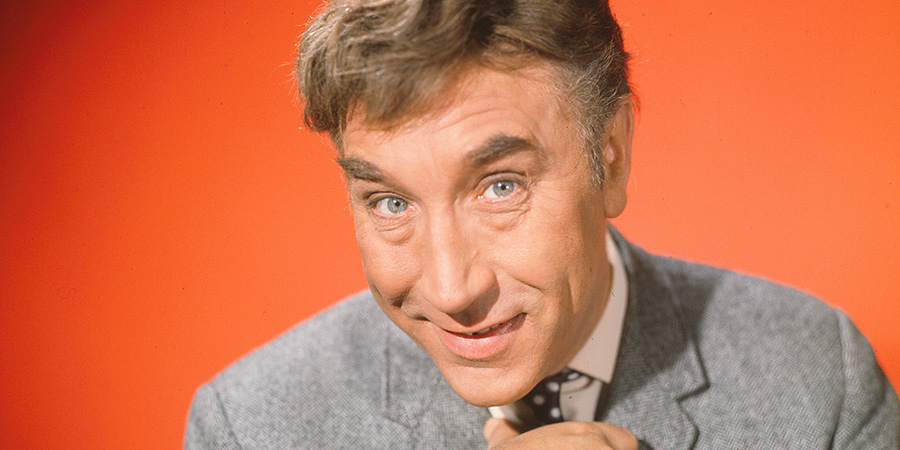
By the mid-1970s, the future for Frankie Howerd was looking bleak. It was far from the first time, for him, that the future had seemed bleak - it had seemed bleak several times before, only to suddenly brighten back up just when all hope was looking lost - but, by the mid-Seventies, he was getting well and truly sick of fearing the worst.
Up Pompeii!, his most recent bona fide TV hit, had ended at the start of the decade. Since then, more often than not, he had been passed over for the prime time spots, and his fragile self-confidence had dropped. He had suffered panic attacks and stage fright while appearing in panto at the London Palladium during the 1973/74 season, and had spent most evenings prior to going on stage vomiting into his dressing room sink.
His sense of insecurity had been made worse by the emergence of Larry Grayson, seemingly in his place, as British television's camp comic du jour. It was bad enough not being able to do his act. It was even worse watching someone else do his act.
There had been the odd bright spot. A trilogy of fifty-minute sketch and stand-up shows for BBC2 entitled An Evening With Francis Howerd, and a rare venture into film with the British-made comedy-thriller The House In Nightmare Park (both in 1973), had been well-received, but most of his other efforts were eliciting tut-tuts more often than titters.
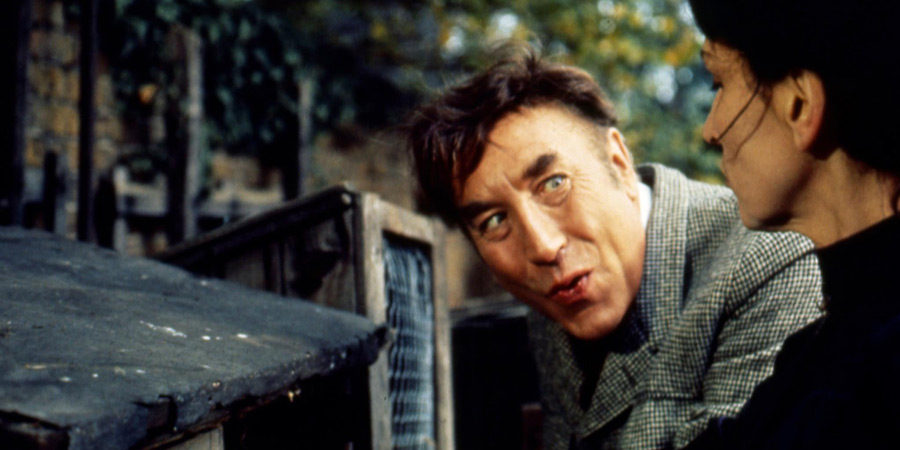
Bids to branch out and do something different were being frustrated (a long-planned part in the distinguished director Michael Powell's version of The Tempest, for example, would fail to materialise due to a lack of funding), while bids to revive former glories had fallen flat (a 1973 Up Pompeii! 'sequel', Whoops Baghdad, seemed so much like more of the same that one critic complained Howerd was 'up to his neck in so much TV corn that he could qualify for membership of the farmers' union').
By the mid-1970s, therefore, Frankie Howerd had come to the conclusion that, if his own country was really so fickle about finding him funny, he might as well try his luck further afield. He decided, in fact, that he should take his comedy elsewhere in the Commonwealth.
He had always been particularly popular in Australia and, to a lesser extent, Canada (where his old shows were still being repeated fairly regularly), and so he now looked to those countries to create some new momentum for his flagging career.
Canada came first. It was the part of North America in which he felt quite comfortable.
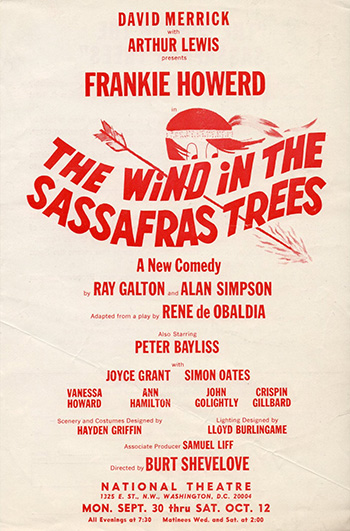
His relationship with the United States of America, in contrast, had never been very encouraging. In 1968, he tried his luck there on the stage with the starring role in The Wind In The Sassafras Trees (later renamed, midway through the run, as Rockefeller And The Red Indians), a French satirical comedy anglicised and adapted expressly for him, by his old friends and protégés Ray Galton and Alan Simpson, so that it took on the shape of a play shambolically presented by an amateurish English repertory company.
It went badly in Boston. 'They hated us,' Ray Galton would tell me. 'How Frank went on, night after night, to a hostile audience for two weeks, I don't know. I really don't know. He must have been on pills!' One widely syndicated reviewer, introducing Howerd to American audiences sneeringly as 'a prominent London comic with a limp-wristed manner', damned the production as 'witless, tasteless and thankless'.
It went much better in Washington. Howerd was praised for his 'careless indifference', and it was noted that his 'asides to the audience are always funny'.
It went even more badly than Boston, however, when it finally reached Broadway. Clive Barnes, the most influential - and savage - of New York's theatre critics, called it 'possibly the finest antidote to insomnia since the discovery of Pentothal'. It closed after just four days, and a humiliated Howerd fled straight back to Britain ('What a pity about Frankie', said the Queen Mother, one of his most celebrated of fans, after reading the reviews).
His old friend David Frost then had his own go at selling Howerd to US audiences by devoting the whole of one of his Stateside chat shows to him in 1969 (Frankie Howerd - Not Just A Sex Symbol), billing him as 'England's funniest comedian'. Few of the critics were particularly impressed, however, and one of them, describing him witheringly as 'a blunt-nosed, toupéed or, more correctly, fright-wigged performer', dismissed his act as 'simpering nonsense' which 'bored his American cousins' (interestingly, while most of the UK media would always maintain a scrupulously polite silence about Howerd's toupée, it would often be one of the first features mentioned by the foreign journalists who wrote about him).
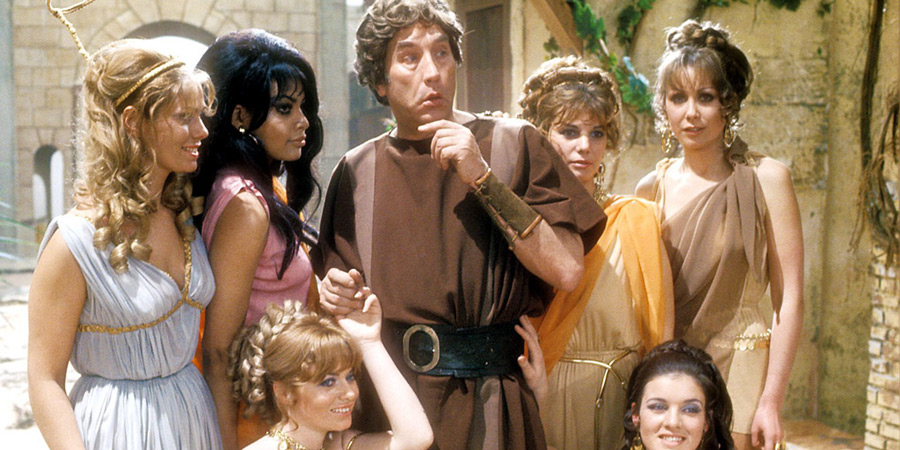
Bruised but still not yet beaten, Howerd returned to the US early in the following decade (sailing over in style on the QE2 in the company of George and Pattie Harrison) when ABC (turning to the British market for 'new' programme ideas) decided to make an American network version of Up Pompeii!, which it planned to call The Pompeii Way. A script for a pilot episode, entitled Oedipus Wrecks, was produced by two young writers, Jeff Harris and Bernie Kukoff, and recorded in November 1972. After a test screening went badly, however, the option of a series was promptly dropped and the show, without being broadcast, was deposited deep in the channel's vaults.
ABC, along with Harris and Kukoff, moved swiftly on and adapted another UK sitcom, the Irene Handl and Wilfred Pickles vehicle For The Love Of Ada (1970), as A Touch Of Grace (1973), and made it into a series. Howerd's dream of breaking into the US, once again, had been dashed.
Canada, however, was another matter. Boasting a comparatively large community of British ex-pats, the country had always been one of the keenest importers of UK-made film, TV and radio, and Howerd was already, for a small and scattered but significant proportion of the country's comedy fans, a fairly familiar figure (Mike Myers, for example, was a teenager at the time, watching avidly along with his Liverpudlian parents at their home in Scarborough, Ontario, whenever Howerd's shows reached the region's screens).
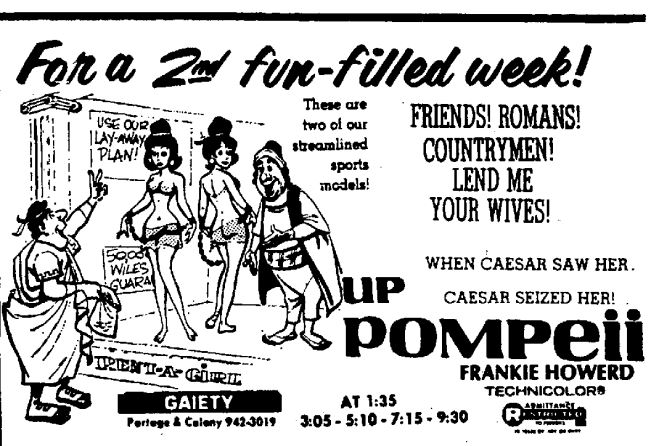
Early in 1974, therefore, with nothing much happening for him in his home country, Howerd decided to take the initiative and contact Thom Benson, then Head of Entertainment Programming at the Canadian public broadcaster CBC, and basically offer himself for work. Benson was somewhat taken aback by this unexpected, and unorthodox, invitation from across the Atlantic, especially as he had never before had anything to do with the comedian, but he politely advised Howerd that he would consider his proposal carefully and get back to him as soon as was practicable.
Benson then passed the matter over to Jim Guthro, his Variety Department's director of planning and production, who was even more bemused by the news than his boss, because, immersed as he was in the management of national talent (and personally more of a fan of music and game shows than comedy), he only had a vague idea as to who Frankie Howerd was. Intrigued, however, by the British comedian's chutzpah, he got in contact with someone who certainly would know all about him: a local scriptwriter and producer named Bill Lynn.
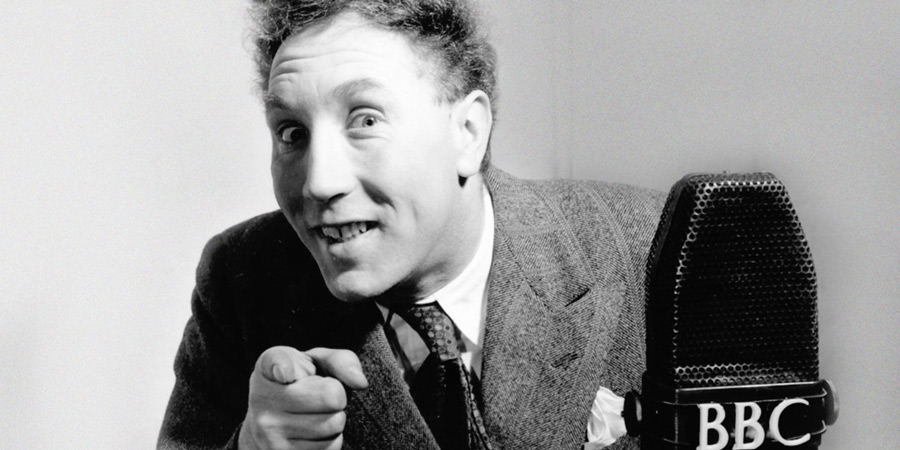
Lynn was not only a keen Anglophile - having lived in London during the 1950s and early 1960s, where he trained as an actor and then spent several years working in repertory before returning home for a new career behind the camera - but also a long-standing fan of Howerd. He was also quite an influential figure within Canadian TV at that time, currently responsible (at least in part) for the country's two top-rated variety shows, The Tommy Hunter Show and The Ronnie Prophet Show, and so his opinions about comedy and comic performers carried some clout.
When he heard that Frankie Howerd was keen to work in Canada, he didn't hesitate to urge Jim Guthro to take the idea seriously, and put himself forward as the man to oversee the project. Guthro, who trusted Lynn greatly, soon agreed, and the writer was instructed to go ahead and start work with the comedian on a potential sitcom.
Lynn's basic proposal, when he made the call to London, was for Howerd to film a pilot episode about an Englishman in Canada, which, if successful, would lead to a full thirteen-week series. Howerd, who often joked in his act about pretending to prevaricate about a job offer ('in the hope that money will eventually be mentioned') when he was actually desperate to accept, now found himself in the same position in real life. This time, however, money was indeed mentioned and the sum deemed to be fair (it was CA$5,000 for the pilot, and $4,000 each for twelve more episodes), so he quickly made it clear that he would accept.
Lynn thus flew to London at the end of August 1974 in order to finalise the deal, and the news was then released to the British media. The project was on.
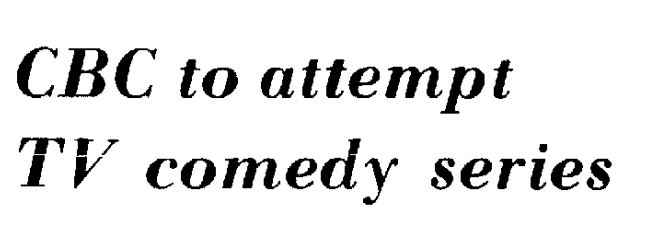
Provisionally entitled Ohhh, Canada, as a vague echo of 'Up Pompeii!', the first script was actually based on a much more conventional 'stranger in town' sitcom idea that Lynn had sketched-out and shelved some time before. Knowing all about Howerd's distinctive style of delivery, however, and the kind of material associated with his UK shows, Lynn had gradually reshaped the scenario and structured it to suit his new star, who - as a succession of drafts made their way back and forth between the two countries - added more and more of his own input to the mix. Eventually, after an intensive few weeks of collaboration, both men felt satisfied and were ready to push the plan forward.
Howerd flew over to Canada and a pilot episode was recorded (twice), over two days, on Thursday and Friday 7-8th November 1974, on a CBC soundstage in Toronto under the supervision of the widely-acclaimed director Norman Campbell. A local reporter, who was invited there to witness the proceedings, would say that the British star was an instant hit with the three-hundred-and-fifty people in the audience:
The crowd couldn't care less if the taping began or not. Frankie Howerd, master of the double entendre, veteran of the off-blue British music hall, was giving them what they wanted already. As his own 'audience warm-up man' he was brilliant. 'Two women with prams,' he said, 'met in a park. One said to the other, "My, isn't your baby small". "Yes," said the other, "but we've only been married a month". As the audience howled, Howerd was already aiming at another punchline, explaining the difference between beer and women in England and Canada. 'Here,' he leered, 'it's the beer that's refrigerated.'
The prompt and positive reaction to the 'recently-married mother' gag must have been a huge relief to Howerd, as well as a source of great encouragement, because whenever he had tried telling it to US audiences (and he did so, doggedly, on multiple occasions over the years), it was usually met with nerve-jangling silence and widespread bemusement.

As for the pilot show itself, the observer's response was similarly encouraging:
The gags are breezy, outrageously blue, and lightning fast. As such they should make the show a smash hit with...well, that less-than-super-sophisticated segment of the Canadian TV audience. Yet even those who prefer caviar to corn-pone will doubtless, despite of themselves, be unable to smother a chuckle - chiefly because of Howerd's infectious joy in his own silly jokes, and the machine-gun pace of Emmy award-winner Norman Campbell's direction.
What happened after the taping might seem, when viewed in isolation, something of a mystery, because not only would the pilot remain un-shown in the months that followed, but no news concerning the commissioning of a series (the contract for which was formally signed the following April) would be made public until one whole year later, in November 1975. There was a simple enough reason for that, however: Canada was now in competition for Howerd's time with Australia.
Australia became involved with Howerd early in 1975, when, after a couple of discreet nudges from him and then several more from the always-supportive David Frost, the Seven Network made contact. The comedian already had a large following Down Under, as he no doubt would have put it, because many of his old radio and TV programmes, dating back to the late 1940s, had been exported to the country, and Up Pompeii! (along with its movie spin-offs) had attracted big and enthusiastic audiences. When, therefore, it was proposed that he travel there to make a series of shows (co-produced with Frost's Paradine Productions company for a fee of AU$5,000 per episode) that would tap into his existing popularity, he was again quick to accept.
Much of the rest of the year, therefore, saw Howerd, based in London, deal with two sets of writers - Bill Lynn and his regular partner Jerry O'Flanagan in Toronto, and Hugh Stuckey and several associates in Sydney - as they worked on shaping each show to suit both his own strengths and the particular tastes of his two audiences. The Australian process was easier, because Howerd had already worked with Stuckey (below, a long-distance but fairly regular contributor to many British comedy shows and performers over the years, as well as the writer responsible for Tony Hancock's own, tragically-curtailed, Australian sitcom) several times before, and trusted him to tailor his scripts effectively. The Canadian process proved more time-consuming and sometimes contentious, as everything from the language to the storylines was fussed over and debated (with the writers trying in particular to distribute more comic lines to the other characters, and Howerd insisting on keeping most of them for himself).
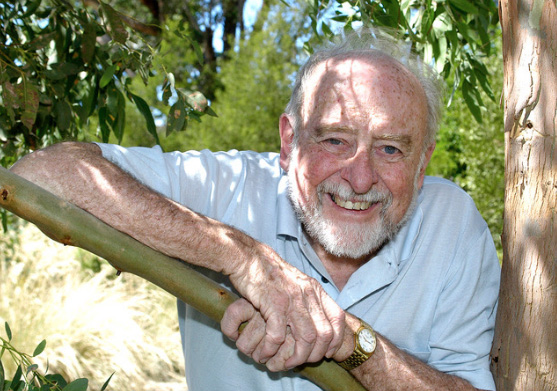
Eventually, after compromises on both sides were made, the two sitcoms were judged more or less ready to move on to the next stage. Other scripts would now be written, and casting would be completed. The international sitcom business was now getting serious.
An upbeat Howerd - eager to let his own country know how in-demand he now was elsewhere - boasted to the Sunday Mirror in November 1975 that he planned to 'make three series on three continents in three months'. He was off to Toronto first, he said, to film thirteen episodes of Ohhh, Canada, and then on to Australia to record five episodes of what had by now been titled Up The Convicts. He also predicted that a pilot he was filming in London for ITV that Christmas, A Touch Of The Casanovas (co-written by the prolific Stuckey and the Carry On and Up Pompeii! stalwart Sid Colin) would lead to a series of its own, and then Up The Convicts would eventually be made into a movie.
As often happened, however, what followed for Howerd was marked by unexpected setbacks, festering frustrations and demoralising disappointments. 1976 would indeed be his busiest year for some time, but by no means one of his most successful.
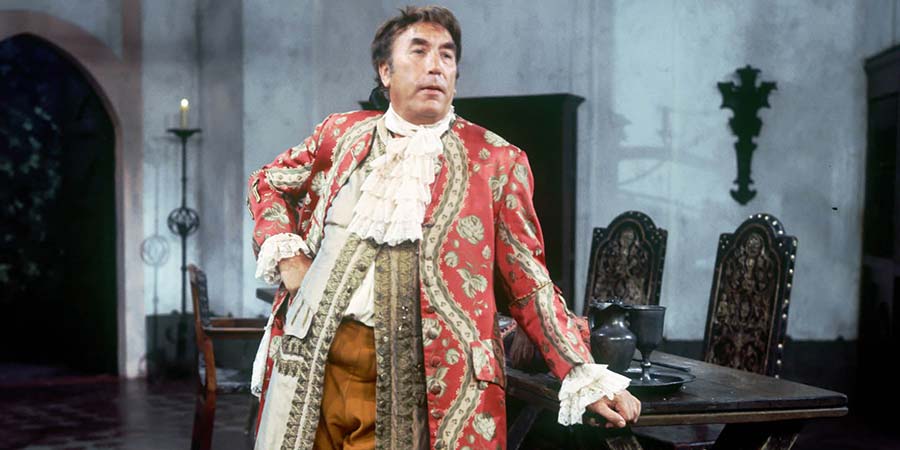
It began badly with the news that ITV was probably going to pass on the option of a series for A Touch Of The Casanovas (above). The critics had not been very kind, judging it 'tired' and 'uninspired', and the imminent cancellation of a show he had touted widely as his UK 'comeback' vehicle hit Howerd hard.
The move abroad, in the circumstances, could not have come at a better time. Canada was not only going to be his first port of call in the New Year, but also his main place of work for an extended period, because his Australian project was already in the can.
Contrary to what he had told the Sunday Mirror, he had actually already recorded all four fifty-minute episodes of Up The Convicts (the planned fifth edition had been dropped long before for financial reasons) during a short and very intense period between 20th October and 15th November 1975 at Sydney's Amalgamated TV Services studios. The series, however, would not be broadcast until the second half of 1976.
His work in Canada, however, was still to be done, and he flew over there at the start of January and plunged straight into the production of his CBC sitcom, taping each show live in front of studio audiences in Toronto. The recordings were organised in two blocks of six, starting on 12th January and ending on 10th April, with a fortnight's break in between.
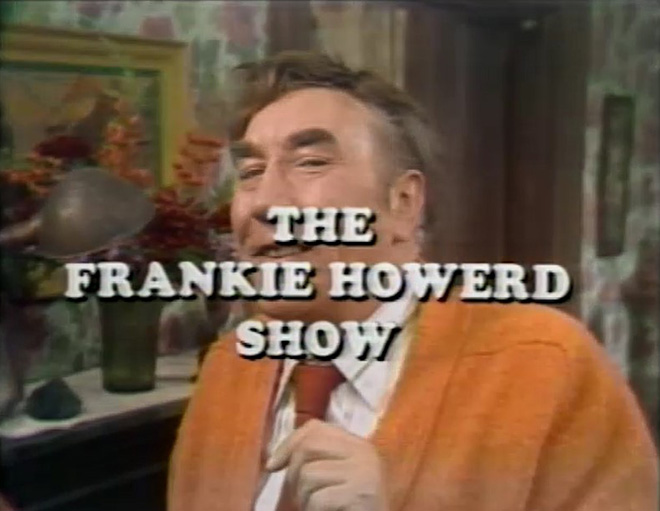
The basic premise of Ohhh, Canada - whose awkward-sounding title he eventually persuaded CBC to change to The Frankie Howerd Show - was that his character, also called Frankie Howerd, a 'ne'er-do-well' English immigrant, has come over to Toronto because he's heard that 'the streets are paved with gold'. He finds himself stuck instead in a city whose sidewalks are scattered with garbage, lodging in a run-down boarding house at 59 Wormvale Road ruled over by Mrs Otterby (played by Ruth Springford), a nosy landlady, and her dim-witted son Hardin (Gary Files), alongside such fellow residents as the indolent, permanently dishevelled, chain-smoking basement dweller Wally Wheeler (Jack Duffy) and a well-proportioned part-time glamour model and 'interpretative dancer' named Denise (Peggy Mahon). The chronically cash-strapped Howerd's challenge each week was to find 'suitable' employment - a task that always put him at loggerheads with some or other Canadian institution, such as the Liquor Control Board, the Sheriff's Department or Canada Manpower, as he tried such occupations as a nightclub bouncer, a newspaper reporter, an interior designer or a TV station cook.
The style of the sitcom stuck to the template provided by Up Pompeii! and most of Howerd's other shows, with an opening monologue direct to camera followed by the star regularly pausing the plot and breaking the fourth wall to look straight at the camera and comment on the script ('That's probably the writers, giving us some more jokes!'), other characters ('It's not right, you know - he gets all the best lines!'), his own struggles ('I've done me best, God only knows!') or the studio audience's reactions ('You dare! Go on - you DARE!'). In his very first 'prologue', for example, Howerd would introduce himself thus:
My name is Howerd. Frankie Howerd. But you can call me Francis. Yes, that's my maiden name, you fools! You fools! What are you? FOOLS - that's right! No, ladies and gentlemen, no, let's have hush, please. Ladies and gentlemen, I have come to this country, this marvellous country, this glorious country, to seek fame and fortune. What do you mean, 'Freeloader'? Don't be wicked! Don't be wick-ed! Don't mock poor Francis! Oh, no, I love it here. I LOVE it here. Let's face it - I love it anywhere! Well, don't you? Yehhsss!
The star did not exactly give the show the hard sell during his round of promotional interviews. After recounting the various setbacks he had suffered over the years back in Britain, he admitted that he didn't expect his Canadian TV debut 'to set the world on fire', but added that 'one hopes that people find it a little different'.
When the series began, however, at 9pm on 19th February (some regions would start on different dates spread over the next seven days), with a slightly re-edited version of the original pilot episode, the reaction was generally very positive. Not everyone liked it (one critic, somewhat illogically, complained about CBC hiring an Englishman to play an English immigrant, and dubbed the show Ugh Canada, while another lamented the fact that 'In this crass show Howerd will do anything to get a laugh short of sitting on a poopie cushion'), but many seemed to love it.
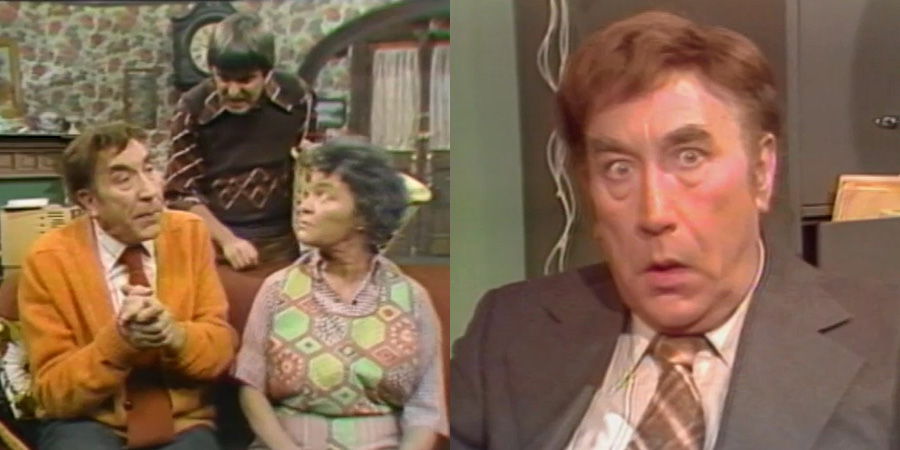
Howerd himself, who was clearly in excellent form, was praised for his 'supreme sense of timing,' and for being 'cheeky, clever and artful' but 'always loveable'. Norman Campbell's direction (which featured plenty of well-timed cuts to his star's conspiratorial looks to camera) was similarly applauded, with several observers appreciating his engagement with such a distinctive style of comic performing.
Lynn and O'Flanagan's shamelessly innuendo-stuffed script (which featured embellishments from the experienced gag writer Ken Finkleman) was also defended doughtily: 'It's risqué, bawdy and outrageous, and may even be denounced as too coarse for Canadian eyes and ears,' one reviewer remarked. 'But it also is so hilarious that the protesters will have trouble smothering their laughter while they phone their MPs.'
It was even reported that CBC's newly-appointed Head of TV Variety, Jack McAndrew, who had inherited the production from Jim Guthro, had been so impressed with the studio audience's noisy enthusiasm that he had asked for future episodes to include the odd shot of them to prove that the show was not relying, as cynics might otherwise have surmised, on canned laughter.
The ratings were also encouragingly solid, comparing well with the previous series in that slot, the increasingly popular Toronto-based sitcom King Of Kensington. The show had, in short, got off to an impressive start.

A few weeks into its run, however, the sitcom was moved from its Thursday night slot (in some regions) to make way for coverage of a series of ice hockey games. Its new home at 8:30pm on Saturdays was technically no real demotion, but the change seemed to confuse, inconvenience or alienate some viewers, who failed to follow it to its new home.
The ratings, as a consequence, began to dip, the reviews dried up, and the sitcom, though it continued to have a fairly large and loyal fan base, crept quietly to a close at the start of June. On any kind of industry scale, it had been far more of a success than a failure, and ought to have been regarded as having provided Howerd with a solid base on which to build, but it appears that the always-cautious and rather conservative CBC had slowly lost interest in the project. Any talk of a second series - which early on had been seriously considered - had long since stopped (with rumours being circulated in the trade press that 'Howerd's brand of lowdown farce seems to have set the corporation on edge'), and The Frankie Howerd Show was left to fade from most Canadians' memory.
It was an odd way for Howerd's North American adventure to end, but there was little time for him to feel sorry for himself. He now had another country, and another sitcom, on which to concentrate.
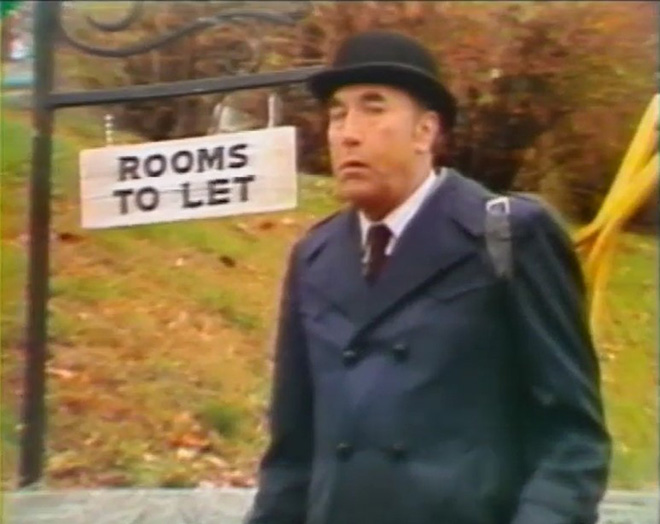
He packed up his things in Toronto (just when, ironically enough, his most recent UK radio show started being aired, and praised, on Canadian stations) and, after taking a very brief vacation at his villa in Malta, arrived in Sydney, Australia, late in July 1976. The sight of some of his old British shows and movies (as well as the likes of Dad's Army and The Goodies) currently being repeated on local television screens was a source of comfort as he settled into his temporary apartment, as were the numerous invitations to meet and greet his many longstanding Australian fans. After several months of having to self-edit his own speech so as to avoid confusing his Canadian audiences ('Shut your gob' was one old and instinctive phrase that he had not been allowed to use), he suddenly felt - almost - at home again on Sydney soil.
There was still some minor editing to be done on the already-filmed episodes, but otherwise Howerd's time was devoted mainly to promoting the upcoming series to the Australian media. Maintaining the theme of him extending his reach into other countries, he strained hard to sound upbeat, and encouraged the impression that this was merely the beginning of his 'home-grown' contributions to the country's comedy.
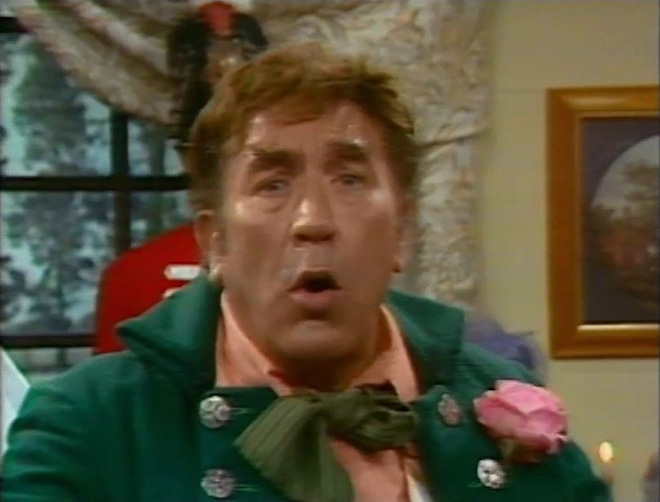
Then, three months after his Canadian sitcom had ended, his Australian sitcom finally reached the screen. Up The Convicts was set in 1820s Sydney, and starred Howerd as Jeremiah Shirk, an English-born convict now working as a servant for a couple of wealthy Botany Bay colonists, the doddery Sir Montague and the fussily well-meaning Lady Fitzgibbon (Wallas Eaton and Carol Raye). Among the other characters featured were the mincingly camp waste-collector Quinney the Garbo (played by Howerd's long-time friend and former partner, Lee Young); the boomingly bad-tempered Sgt Bastion (Frank Thring); and an assortment of young female stooges including Kate Fitzpatrick, Anne Lambert, Jacki Weaver and the mononymed Abigail.
The first episode was shown at 9:30pm on Thursday 19th August 1976. There was no great fanfare for the event, but the country's existing Howerd fans were certainly encouraged to watch his debut in an Australian-made show.
Now billed as four 'specials', the rest of the run of Up The Convicts would be spread out over the remainder of the year, long after Howerd himself had returned to London. The second episode was broadcast on Tuesday 21st September, the third on Friday 10th December and the fourth and final one on Friday 17th December.
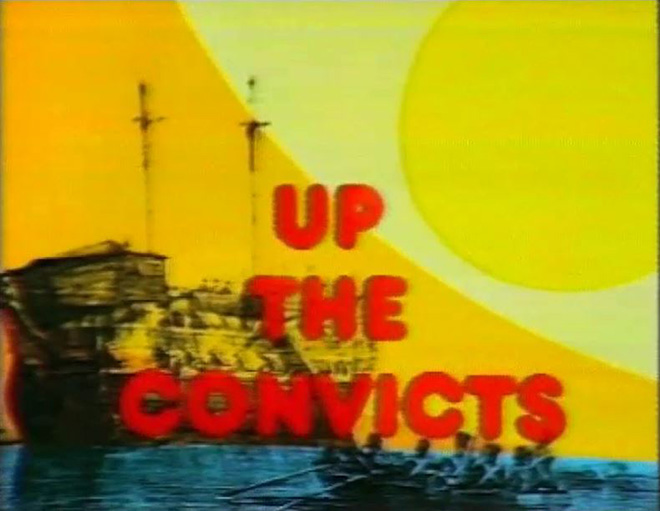
On the evidence of the sole episode currently available, Howerd's performance, compared to that in his Canadian sitcom, was a little under-par and distinctly uneven. At times, he held everything together admirably with his rare craft and charm. At other times, however, he seemed rather lethargic, slightly unsure of his lines, and more than slightly rattled whenever one of the other actors tried to compete for the camera with an impromptu bit of business.
Other aspects of the production also appeared inferior to its Canadian cousin. The length of the episodes, for one thing, was too long, and far too slow-paced. There was also an under-rehearsed 'rough-and-ready' feel to the shows, with some jarringly heavy-handed edits where someone or other had to re-try a line. It was also evident that not all of the Australian cast were used to playing in front of a noisy studio audience, with Howerd having to save their laugh-drowned lines with the odd 'Eh?' 'What was that?' or 'Say it again?'
Then there was Hugh Stuckey's script, which at times tended to resemble a patchwork quilt made from whatever scraps of old comic dialogue he and Howerd happened to have had lying around:
LADY FITZGIBBON: Now, Shirk, Sir Montague and I have been discussing your future.
SHIRK: Yes, ma'am?
LADY FITZGIBBON: You have so much in front of you.
SHIRK: Oh, I don't want to boast, but...
LADY FITZGIBBON: Tell me, have you been thinking about it lately?
SHIRK: I think of nothing else, ma'am!
LADY FITZGIBBON: Well, you see, that's good, because I know just what you want.
SHIRK: Oh, yes? I want stuffing. [To the audience] For the chicken, for the chicken! Shut your faces now! Naught-tee!
LADY FITZGIBBON: Shirk, we are not talking about chickens, we are talking about wives.
SHIRK: Oohhhhh!
LADY FITZGIBBON: Sir Montague and I think that you should really give serious thought to taking a wife.
SHIRK: I agree. But whose wife should I take?
LADY FITZGIBBON: Shirk! Your own! Your own!
SHIRK: But I haven't got one, have I?!
LADY FITZGIBBON: Oh, you could have, Shirk. And just think: you could settle down and have a dear little farm, and raise chickens and goats and cattle.
SHIRK: Oh, couldn't I raise children like everyone else?
LADY FITZGIBBON: Shirk, don't be ridiculous! The thing is, I have already chosen a young woman who I think is eminently suitable.
SHIRK: Really?
LADY FITZGIBBON: Yes.
SHIRK: But is she my type?
LADY FITZGIBBON: Oh, she can cook and sew. She's honest, trustworthy and reliable.
SHIRK: Ah, yes. But is she my type?
LADY FITZGIBBON: She has outstanding features.
SHIRK: Oooh, she is my type!
The critics' response was most notable for its scarcity. Each episode came and went with barely any mention, good or bad, in the press.
Not even the Seven Network itself seemed sure what to make of - or do with - the series, treating it with a carelessness that bordered on the incoherent. The scheduling of each broadcast, on those particular evenings, was more or less ideal for attracting Australia's cultural Anglophiles, with the programmes being slotted-in between repeats of the likes of On The Buses and The Sweeney. The long, unexplained and seemingly arbitrary gaps between the shows, on the other hand, denied the series any real chance of building up any momentum.
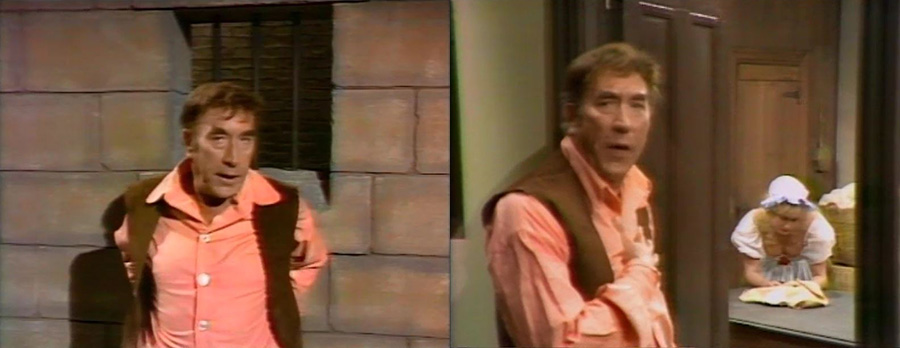
It suggested that the bosses had already lost faith in the long-term potential of the sitcom even before it had reached the screen. Howerd had been telling journalists over recent months that he hoped not only to return to Australia in 1977 to record a second, longer, series, but also to make a spin-off movie, but no one at the network seemed to share his enthusiasm.
Up The Convicts ended its odd little run without anyone offering much comment. It would be repeated a few months later, but was met with much the same indifference as before.
Frankie Howerd started 1977, therefore, back in London, and back in a state of anxiety, knowing that his Commonwealth adventures were over. As far as his involvement with the US was concerned, however, there would be not so much one last hurrah, as one last ho-hum.
The Robert Stigwood Organisation cast him as 'Mean Mr Mustard' in its forthcoming movie version of The Beatles' Sgt. Pepper's Lonely Hearts Club Band (which would be released in 1978). It helped that he had been friends for several years with the main stars of the film, the Bee Gees, who were then right at the height of their fame. It probably also helped that he happened to be a shareholder in The Robert Stigwood Organisation.
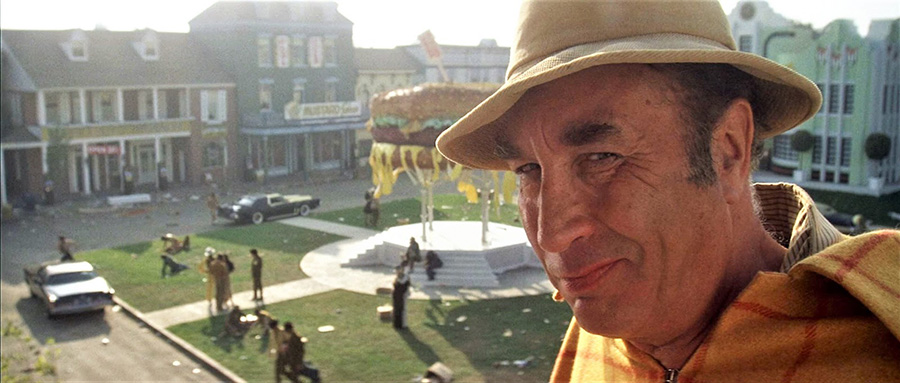
What was of no help at all, however, was the fact that the finished movie, though heavily hyped, was savaged by the critics and shunned by large sections of the public ('It was like Saturday Night Fever,' Howerd later reflected ruefully, 'but without the fever'). The irony was that, in stark contrast to just about everyone else involved, it won him the best reviews he would ever get from the American Press.
'The verdict,' wrote one observer, 'is that grand larceny has been committed on screen by British comic Frankie Howerd, who steals the Henry Edwards-scripted picture.' It was just a pity, on this particular occasion, that nobody wanted it back.
Things would eventually get better for Howerd back home in Britain. There would be a few more years when work seemed fairly scarce and life felt a bit of a struggle, and then, just like they had done so many times before in his career, fashions changed, tastes turned, and suddenly the British public started to remember how much they really loved Frankie Howerd.
There was no real bitterness from him, nor much cynicism, in the face of such fickleness. He was simply relieved, and grateful, that he was able once again to do what he did best, where he did it best. He was back home, and back in business, at last.
Help us publish more great content by becoming a BCG Supporter. You'll be backing our mission to champion, celebrate and promote British comedy in all its forms: past, present and future.
We understand times are tough, but if you believe in the power of laughter we'd be honoured to have you join us. Advertising doesn't cover our costs, so every single donation matters and is put to good use. Thank you.
Love comedy? Find out moreThe Frankie Howerd Collection

Frankie Howerd, one of the 20th Century's best-loved comics, left behind a wide variety of work. Arguably his most well-known and loved role was that of Lurcio in Up Pompeii!, available on DVD here for the first time.
Contents are as follows:
Up Pompeii! Pilot episode (1969)
Up Pompeii! Series 1 (1970)
Up Pompeii! Series 2 (1970)
Further Up Pompeii! Special (1975)
Then Churchill Said To Me (1982)
Comedy Greats: Frankie Howerd
The Comedy Greats DVD contains sketches from An Evening With Frankie Howerd and Royal Variety Performances, as well as chat show appearances with the likes of Michael Parkinson and Terry Wogan.
First released: Monday 16th October 2006
- Distributor: 2 Entertain
- Region: 2 & 4
- Discs: 5
- Minutes: 676
- Subtitles: English
- Catalogue: BBCDVD2119
![]() Buy and sell old and new items
Buy and sell old and new items
Search for this product on eBay
BCG may earn commission on sales generated through the links above.
Frankie Howerd - The Lost Television Pilots

A collection of rare television pilots featuring the one and only Frankie Howerd.
Born 6th March 1917, Francis Alick Howerd was once described by Barry Cryer as a comic actor whose career was a series of comebacks. Frankie Howerd was very successful in Britain, but found it harder to break into the US, Canadian and Australian markets. These pilots made in the 1970s provide a rare insight into his work abroad.
From these pilots, the most famous series is Up The Convicts, made by the 7 Network in Australia, and ran for just four episodes. Frankie played Jeremiah Shirk, sentenced to a penal colony in New South Wales, Australia. If you enjoy watching Up Pompeii then Up The Convicts will give you pleasure as well.
This collection includes: Up The Convicts - Episode 3, The Gong Show pilot & The Frankie Howerd Show (CBC) - 2 episodes.
Also included are a number of rare interviews with Frankie Howerd, from Ryan's Roost, The Mike Douglas Show and The Merv Grffin Show.
First released: Monday 13th August 2018
- Distributor: Simply Media
- Region: 2
- Discs: 2
- Minutes: 166
- Catalogue: 188964
![]() Buy and sell old and new items
Buy and sell old and new items
Search for this product on eBay
BCG may earn commission on sales generated through the links above.
The House In Nightmare Park

Comedy legend Frankie Howerd stars as the victim of sinister shenanigans in this hilarious spoof of British horror films of the early '70s. Starring Hugh Burden and Oscar winner Ray Milland, and written by Terry Nation, The House In Nightmare Park is featured here in a brand-new transfer from original film elements in its as-exhibited theatrical aspect ratio.
Foster Twelvetrees, a struggling tragedian who scrapes a living by giving hammy performances from the classics, can hardly believe his luck when he's invited to give a dramatic reading at the country home of a well-off family. Joy soon turns to outraged horror when he discovers dead bodies, foul intentions, lots of snakes and a madwoman in the attic. Can he uncover the hidden family secret before he comes to a sticky end..?
First released: Monday 8th April 2013
- Released: Monday 28th October 2019
- Distributor: Network
- Region: B
- Discs: 1
- Minutes: 96
- Subtitles: English
- Catalogue: 7958234
![]() Buy and sell old and new items
Buy and sell old and new items
Search for this product on eBay
BCG may earn commission on sales generated through the links above.
- Distributor: Network
- Region: 2
- Discs: 1
- Minutes: 95
- Catalogue: 7953856
![]() Buy and sell old and new items
Buy and sell old and new items
Search for this product on eBay
BCG may earn commission on sales generated through the links above.
- Distributor: Network
- Minutes: 92
BCG may earn commission on sales generated through the links above.
Frankie Howerd: Stand-up Comic

The most authoritative biography of Britain's most subversive twentieth century clown from celebrated biographer Graham McCann, author of Dad's Army: The Story Of A Classic Television Show and Morecambe & Wise.
The rambling perambulations, the catchphrases, the bland brown suit and chestnut hairpiece: such were the hallmarks of a revolution in stand-up comedy that came in the unique shape of Frankie Howerd. His act was all about his lack of act, his humour reliant on trying to prevent the audience from laughing ('No, no please, now...now control please, control').
This new biography from Graham McCann charts the circuitous course of an extraordinary career - moving from his early, exceptional, success in the forties and early fifties as a radio star, through a period at the end of the fifties when he was all but forgotten as a has-been, to his rediscovery in the early sixties by Peter Cook. Howerd returned to television popularity with Up Pompeii!, which led to work with the Carry On team. In his last few years he became the unlikely doyen of the late eighties 'alternative' comedy circuit. But his life off-stage was equally fascinating: full of secrets, insecurities (leading at one point to a nervous breakdown) and unexpected friendships.
Graham McCann vividly captures both Howerd's colourful career and precarious private life through extensive new research and original interviews with such figures as Paul McCartney, Eric Sykes, Bill Cotton, Barbara Windsor, Joan Sims and Michael Grade. This exceptional biography brings to life an exceptional British entertainer.
First published: Monday 18th October 2004
- Published: Monday 4th July 2005
- Publisher: HarperCollins
- Pages: 384
- Catalogue: 9781841153117
![]() Buy and sell old and new items
Buy and sell old and new items
Search for this product on eBay
BCG may earn commission on sales generated through the links above.
- Published: Thursday 25th February 2016
- Publisher: HarperCollins
- Download: 1.22mb
BCG may earn commission on sales generated through the links above.
- Publisher: Fourth Estate Ltd
- Pages: 384
- Catalogue: 9781841153100
![]() Buy and sell old and new items
Buy and sell old and new items
Search for this product on eBay
BCG may earn commission on sales generated through the links above.
A Touch Of The Casanovas

Following the resounding success of Up Pompeii!, Frankie Howerd delved into the pages of history once more to play the hapless valet of Venice's most infamous son in this 37 minute pilot. Double entendre and wicked punning run riot in this 1975 production, co-written by noted screenwriter Sid Colin, whose credits include Up Pompeii! itself and The Army Game.
A coach lumbers along the road from Venice to Padua. Inside is Giacomo Casanova, on the run from the Doge of Venice and intent on carrying out his latest female conquest. Up on the box is Francisco, his body servant ("No, no, wait a minute! It doesn't mean what you think it does!"); he's merely intent on staying out of the clutches of the Doge's guardsmen. When Casanova proposes they swap identities, Francisco finds that life isn't all roses for the legendary lover...
First released: Sunday 8th July 2012
- Distributor: Network
- Region: 2
- Discs: 1
- Catalogue: 7953741
![]() Buy and sell old and new items
Buy and sell old and new items
Search for this product on eBay
BCG may earn commission on sales generated through the links above.

